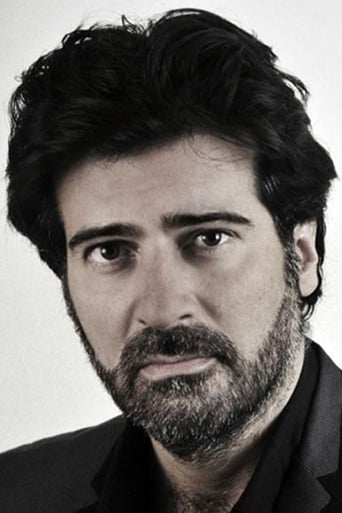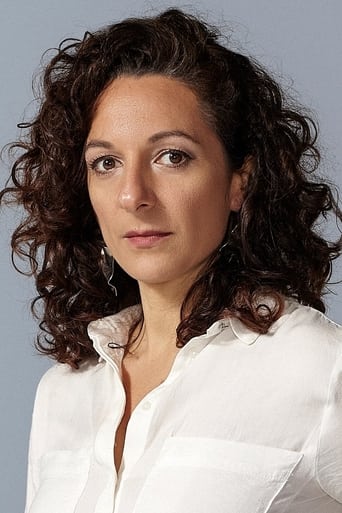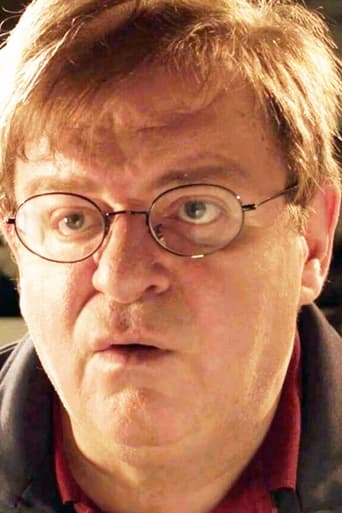GarnettTeenage
The film was still a fun one that will make you laugh and have you leaving the theater feeling like you just stole something valuable and got away with it.
AshUnow
This is a small, humorous movie in some ways, but it has a huge heart. What a nice experience.
Fatma Suarez
The movie's neither hopeful in contrived ways, nor hopeless in different contrived ways. Somehow it manages to be wonderful
Billy Ollie
Through painfully honest and emotional moments, the movie becomes irresistibly relatable
ksf-2
Rafael Spregelburd is "Víctor", a cynical critic, who watches films with his cynical cronies. ( He uses a fun gadget in the dark theater... a pen with a tiny light attached so he can see as he writes.) All of his interactions are awkward and disturbing, and he's a pretty terrible person. On a date, he pretends to choke the woman who has not yet smiled, so of course, she leaves. And when a friend tries to talk about a new love she has met, Victor keeps changing the subject. We see him go through a date's backpack... just more evidence of what a bad man he his. At the very start of the film, the narrator says "we are in argentine, but I prefer to speak the more respectable french"... he always seems to think he is better than everyone else. So far, he's been a pretty crummy person. But then he meets Sofia, and she challenges him, and tries to turn him into a human being. then things get even more complicated... Written and directed by Hernán Guerschuny. The subtitles are pretty rough... they left some things out of translation, here and there. The plot has some twists and turns. It's pretty good, if you stick around to the bitter end.
hof-4
Victor Tellez is a movie critic writing for a Buenos Aires newspaper of wide circulation. He is so much into Nouvelle Vague movies that we hear him thinking in French and using movie lines in conversation. Thinking in French in Argentina is not an unusual phenomenon; many 20th century intellectuals like Victoria Ocampo thought in French and then translated (sometimes clumsily) to their native language like Tolstoi's Russian aristocrats a century earlier.The first half of the movie shows Tellez doing his thing rather pathetically. He is divorced and looking unsuccessfully for a partner and lives in a dark borrowed flat where construction noises are constantly present. He is the very model of a destructive (or rather unfeeling) critic. Although his reviews are altered at will by the newspaper's editor, Tellez believes in his mission of teaching the public to distinguish between good and bad in movies, and we witness an unintended (and devastating) consequence of his pedantry. Obviously, he eschews sentimentality and romanticism as "vulgar."In the second half, life bursts into Tellez's universe, and I believe the director's intention here is to compare movie scripts and real life. Scripts (especially Nouvelle vague scripts) are usually rich in explaining character's actions (e.g. the obtrusive narrator in Truffaut movies). Tellez himself is writing a movie script and he is repeatedly requested to clarify the intentions and motivations of his characters. Real life situations, however, are usually a lot less clean cut, motivations (including one's own) are obscure or entirely unknown, intentions are equally elusive, meaningless coincidences happen, and sentimentality, romanticism and vulgarity rear their heads in unexpected places. The script by director Hernán Gerschuny is subtle, witty and low key; as in any superior movie, the message (if any) is not overly explicit and left to the viewer. Gerschuny's direction is flawless, and he is supported by a cast of uniformly excellent actors, beginning with Rafael Spregelburd and Dolores Fonzi. Production values are at the same level. This is Gerschuny's first feature movie. His second (Una Noche de Amor, 2016) is also a must watch. I am looking forward to his future work.
CleveMan66
This movie is right up my alley! Not just in terms of its subject matter, but also its attitude towards many of the people who do what I'm doing right now. If you think, as I do, that most movie critics have forgotten what it's like to just be a movie fan and seem to go out of their way to nitpick and tear apart movies, you may find this movie both entertaining and validating."What if your life became a movie... that you hate?" That's the tag line on the movie poster for "The Film Critic" (NR, 1:38). It's a case of art imitating life and art imitating… art. A production of Argentina, the movie is called "El crítico" back where it came from, but it addresses universal themes of art, love and finding a place in the world in which you are comfortable, regardless of what others think.Victor Tellez (Rafael Spregelburd) is an influential film critic who thinks a lot of himself and very little of most movies he sees. He lives in a Spanish-speaking country, but prefers to think in French. (His thoughts are audible at various points and are appropriately subtitled for Spanish-speaking and English-speaking audiences.) As Tellez attends a seemingly endless string of private screenings with his fellow critics, he then joins his colleagues in complaining about what they just saw. Tellez has a reputation for being an especially critical critic and is confronted and stalked throughout the movie by a young filmmaker whose passion project Tellez savaged in one of his reviews. When Tellez visits his niece Agatha (Telma Crisanti) at the video store where she works, they disagree over which kind of films are quality films. Tellez complains in particular about how formulaic romantic comedies are. Then, much like the characters in the original "Scream" (1996), after discussing the rules of the genre, Tellez finds himself bound by those same rules – when he gets involved with a beautiful young woman.While searching for a new apartment, he meets Sophie (Dolores Fonzi), a very desirable woman who's very different from him, especially when it comes to her taste in movies. He keeps running into her throughout the city (as in 1989's "When Harry Met Sally…") and they start to date. It's pretty funny seeing the jaded Tellez work his way through the rules of the rom-com, and hearing portions of his internal monologue adds to the humor of his situation. Through his relationship with Sophie, the influence of Agatha and the experience of writing a screenplay which becomes a romantic comedy, his perspective changes. However, in spite of Tellez' life beginning to follow a typical rom-com pattern, he also learns that the rules can be broken."The Film Critic" is a clever self-referential meditation on love in the modern world, but could have gotten more out of its premise. The film takes a little too long to get to Tellez' relationship with Sophie. Late in the movie, the story takes a sudden turn into a dramatic subplot that seems like a distraction from what the movie is really about – and is then dropped with no follow-up. Fonzi makes Sophie a pleasure to watch, but inadvertently calls attention to her co-star's lack of charisma. It's too bad that this film couldn't deliver on the promise of its central idea more effectively and for a larger percentage of the film, because when it's focused on what makes it special, it's tough to criticize. But, taken as a whole, this film critic (although I still prefer the term "movie reviewer") gives "The Film Critic" a "B".
simona gianotti
I doubt that a movie like this will ever reach large audiences, however I could enjoy it during a long flight to South America (this is indeed a Chile-Argentina co-production). It is a playful but sharp Romantic comedy, whose protagonist is a movie critic, who tired of the triviality of life and of romantic comedies reflecting that same life finds himself to live a true romance, and has to cope with it, thus questioning all his certainties about life and cinema. So, the eternal dilemma of art representing life and vice versa is brilliantly explored through the progress of his love story. Movie lovers, of any kind, will love this picture, showing both visual references and quotes from some famous movies of the past, they will like its ironic attitude towards the sophisticated and out-of –the world critic, who gets alienated from life by thinking in French as if he were living in a nouvelle vague movie. I also appreciated its re-affirmation of the value a good romantic comedy, without too much ambition, except that of entertaining and pleasing the viewer. And that was the effect on me, it was 100 minutes of entertainment and helped stand a long flight, with funny moments and some reflection on the art of cinema








